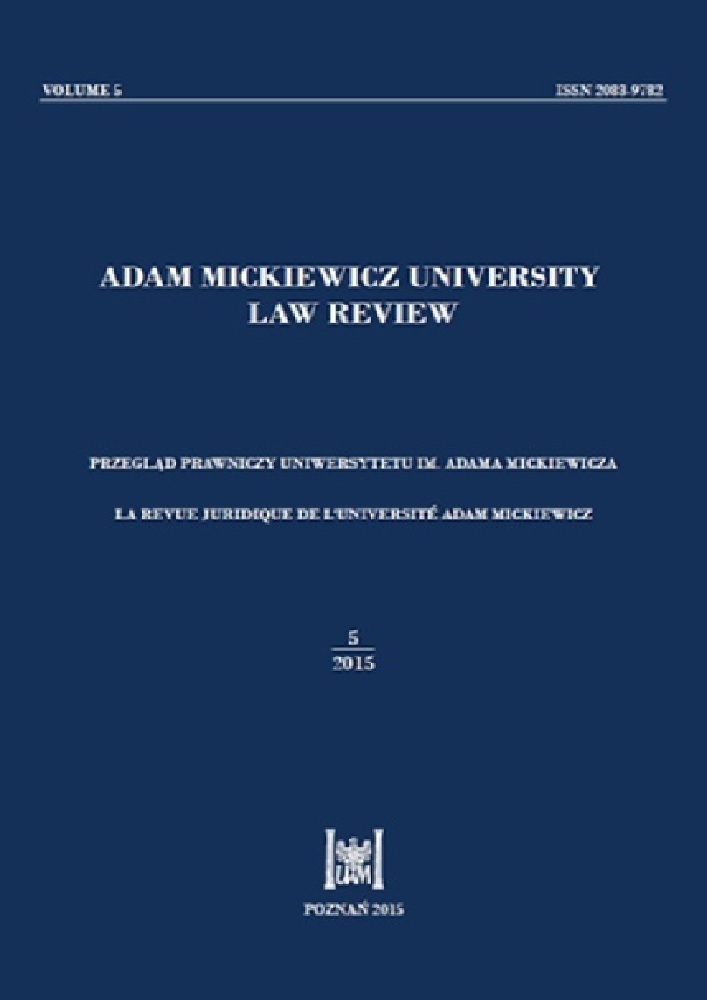Abstract
The aims of the article are to analyse the legal status of English after Brexit and present possible scenarios for this language in the post-Brexit Union. Firstly, the article highlights the status of languages in the EU and depicts three major categories of languages in the EU: Treaty languages, official and working languages. Secondly, the article analyses two possible scenarios for retaining the official and working status of English through notifications by Ireland and Malta. Thirdly, the paper focuses on the third scenario of introducing English as a single EU official language. Finally, the article outlines the status quo of English in the EU after UK’s withdrawal from the EU. It concludes that English is likely to remain the official and working language of the EU as a result of proper notification made by either Ireland or Malta.
References
Baaij, Cornelis J. W. “The EU policy on institutional multilingualism: between principles and practicality.” JLL 1. 2012: 14–32.
Bond, Esther. “EU provides clarity on post-Brexit future for English language.” Slator, 15 May 2018, <https://slator.com/demand-drivers/eu-provides-clarity-on-post-brexit-future-for-english-language/>, access: 6.11.2019.
Carson, Lorna. Multilingualism in Europe. A Case Study. Brussels, 2003.
Christiansen, Pia Vanting. “Language policy in the European Union: European/English/Elite/Equal/Esperanto Union?” Language Problems and Language Planning 30, no. 1. 2006: 21–44. DOI: https://doi.org/10.1075/lplp.30.1.03chr
Coulmas, Florian, ed. A language policy for the European Community: Prospects and Quandaries. Berlin, 2013.
Creech, Richard L. Law and language in the European Union: the paradox of a Babel “united in diversity”. Europa Law Publishing, 2007.
Crystal, David. “The future of new Euro-English.” World Englishes 36, no. 3. 2017: 330–335. DOI: https://doi.org/10.1111/weng.12266
De La Baume, Maïa. “As British leaves, English on rise in EU – to French horror.” Politico, 5 October 2018, <https://www.politico.eu/article/french-english-language-brexit-european-parliament-ecj-commission-eu-next-waterloo/>, access: 6.11.2019.
De Swaan, Abram. Words of the World: The Global Language System. Amsterdam, 2005.
Doczekalska, Agnieszka. “Angielski może w UE zostać po brexicie.” Prawo.pl, 13 October 2018, <https://www.prawo.pl/prawo/jezyk-angielski-w-ue-zostanie-po-brexicie,313073.html>, access: 1.07.2019.
Doczekalska, Agnieszka. “Legal Multilingualism as a right to remain unilingual – fiction or reality?” Comparative Lengilinguistics 20. 2014: 7–18.
Forrest, Alan. “The politics of language in the European Union.” European Review 6, no. 3. 1998: 299–319. DOI: https://doi.org/10.1017/S1062798700003343
Gajda, Anastazja. “Wielojęzyczność Unii Europejskiej.” Socjolingwistyka, no. 27. 2013: 7–29.
Iuaristi, Patxi, Timothy Reagan, and Humphrey Tonkin. “Language diversity in the European Union.” In Respecting Linguistic Diversity in the European Union, edited by Xabier Arzoz. Amsterdam, Philadelphia, 2008: 47–72. DOI: https://doi.org/10.1075/wlp.2.05jua
Labrie, Normand. La construction linguistique de la Communauté européenne. Paris, 1993. DOI: https://doi.org/10.4000/books.psn.11267
Modiano, Marko. “English in a post-Brexit European Union.” World Englishes 36, no. 3. 2017: 313–327. DOI: https://doi.org/10.1111/weng.12264
Phillipson, Robert. English-only Europe?: Challenging language policy. London, New York, 2004. DOI: https://doi.org/10.4324/9780203696989
Pool, Johnathan. “Optimal language regimes for the European Union.” International Journal of the Sociology of Language 121. 1996: 159–179. DOI: https://doi.org/10.1515/ijsl.1996.121.159
Ristikivi, Merike. “Latin: the common legal language of Europe.” Juridica International, no. X. 2005: 199–202.
Salverda, Reinier. “Language diversity and international communication.” English Today 18, no. 3. 2002: 3–11. DOI: https://doi.org/10.1017/S0266078402003012
Schilling, Theodor. “Language rights in the European Union.” German Law Journal 9, no. 10. 2008: 1219–1242.
Suwara, Ewa. “Wyzwania prawno-proceduralne dla Unii Europejskiej związane z BREXIT-em.” Europejski Przegląd Sądowy, no. 9. 2016: 11–17.
Communication from the Commission to the Council, the European Parliament, the European Economic and Social Committee and the Committee of the Regions – A New Framework Strategy for Multilingualism, COM(2005) 596. Communication from the Commission to the European Parliament, the European Council, the Council, the European Economic and Social Committee and the Committee of the Regions: A Modern Budget for a Union that Protects, Empowers and Defends The Multiannual Financial Framework for 2021–2027, COM 2018 (321).
Constitution of Ireland, <http://www.irishstatutebook.ie/eli/cons/en/html#part2>, access: 17.02.2020.
Constitution of Malta, <https://www.constitution.org/cons/malta/chapt0.pdf>, access:17.02.2020.
Council Regulation (EC) No. 930/2004 of 1 May 2004 on temporary derogation measures relating to the drafting in Maltese of the acts of the institutions of the European Union, OJ L 169, 1 May 2004.
Council Regulation (EC) No. 1738/2006 of 23 November 2006 amending Regulation (EC) No 930/2004 on temporary derogation measures relating to the drafting in Maltese of the acts of the institutions of the European Union, OJ L 329, 25 November 2006.
EU languages, <https://europa.eu/european-union/about-eu/eu-languages_en>, access: 11.05.2020.
European Commission, Promoting Language Learning and Linguistic Diversity. An Action Plan 2004–2006. COM (2003) 449.
European Commission, Special Eurobarometer No. 386. Europeans and Languages, 2012. <http://ec.europa.eu/commfrontoffice/publicopinion/archives/ebs/ebs_386.en.pdf>, access: 1.07.2019.
European Commission, Translation at the European Commission – a history [Brochure]. Luxembourg: Office for Official Publications of the European Communities, <http://bookshop.europa.eu/is-bin/INTERSHOP.enfinity/WFS/EU-Bookshop-Site/en_GB/-/EUR/ViewPublication-Start?Publication Key=HC3008397>, access: 15.11.2019.
Information available on the European Commission website: <http://ec.europa.eu/dgs/translation/translating/officiallanguages/index_en.htm>, access: 5.11.2019. Information available on the European Commission website: <http://ec.europa.eu/dgs/translation/translating/officiallanguages/index_en.htm>, access: 16.09.2017.
Judgment of the Court of 6 October 1982 in the case 283/81 Srl CILFIT and Lanificio di Gavardo SpA v. Ministry of Health, ECLI:EU:C:1982:335.
Parliamentary questions of 30 January 2019. Question for written answer E-000517–19 to the Commission Rule 130, Innocenzo Leontini (ECR), <http://www.europarl.europa.eu/doceo/document/E-8–2019–000517_EN.html>, access: 15.11.2019.
Protocols on the Privileges and Immunities and on the Statue of the Court of Justice of the European Economic Community, Publishing Services of the European Communities, 8012/5/XII/1962/5.
Regulation No. 1 determining the languages to be used by the European Economic Community. OJ 017, 1 July 2013.
Treaty establishing the European Atomic Energy Community (EURATOM). Signed on 25 March 1957. OJ EU 2010/C 84/01.
Treaty establishing the European Economic Community. Signed on 25 March 1957. OJ EU C 312 E/1.
Treaty on European Union and Treaty on the Functioning of the European Union, OJ 2016 C 202, 7 June 2016.
License
Copyright (c) 2023 Aneta Skorupa-Wulczyńska

This work is licensed under a Creative Commons Attribution 4.0 International License.

